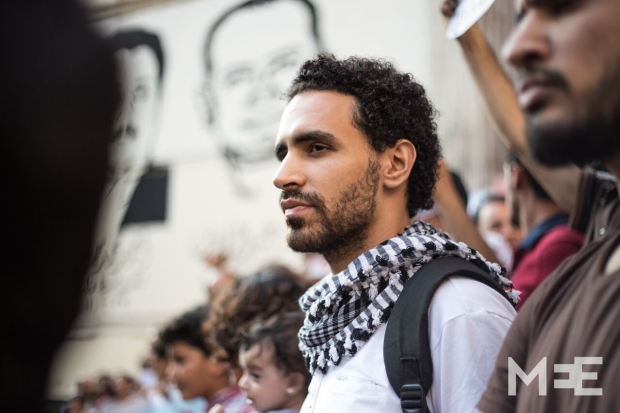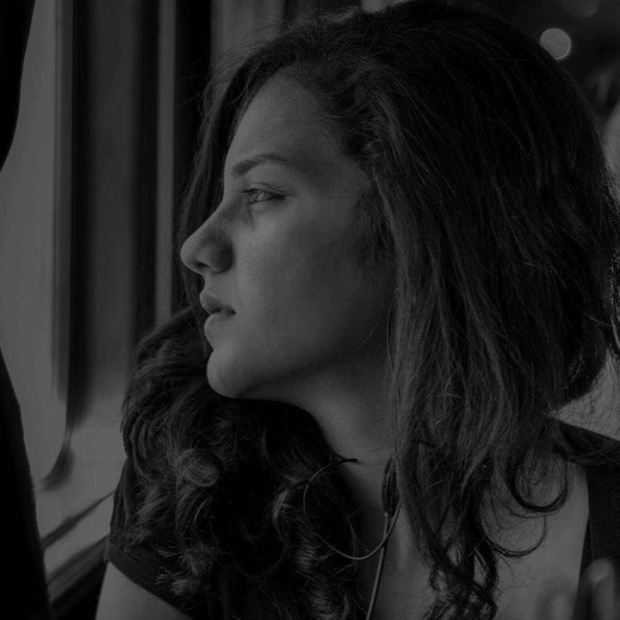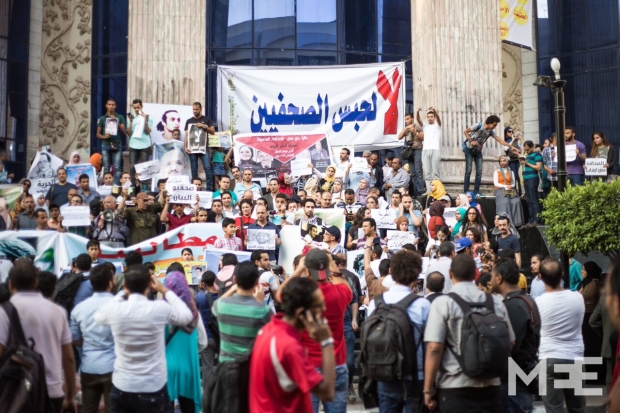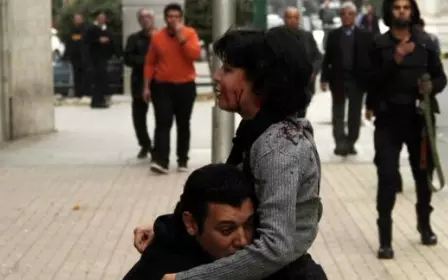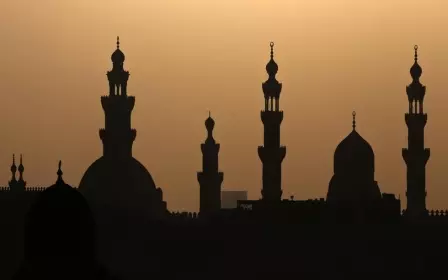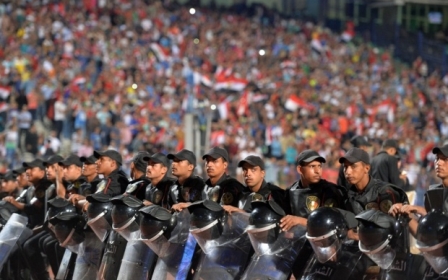Ahmed Gamal Zyada: 'I'm afraid, but I am not going to be silent'
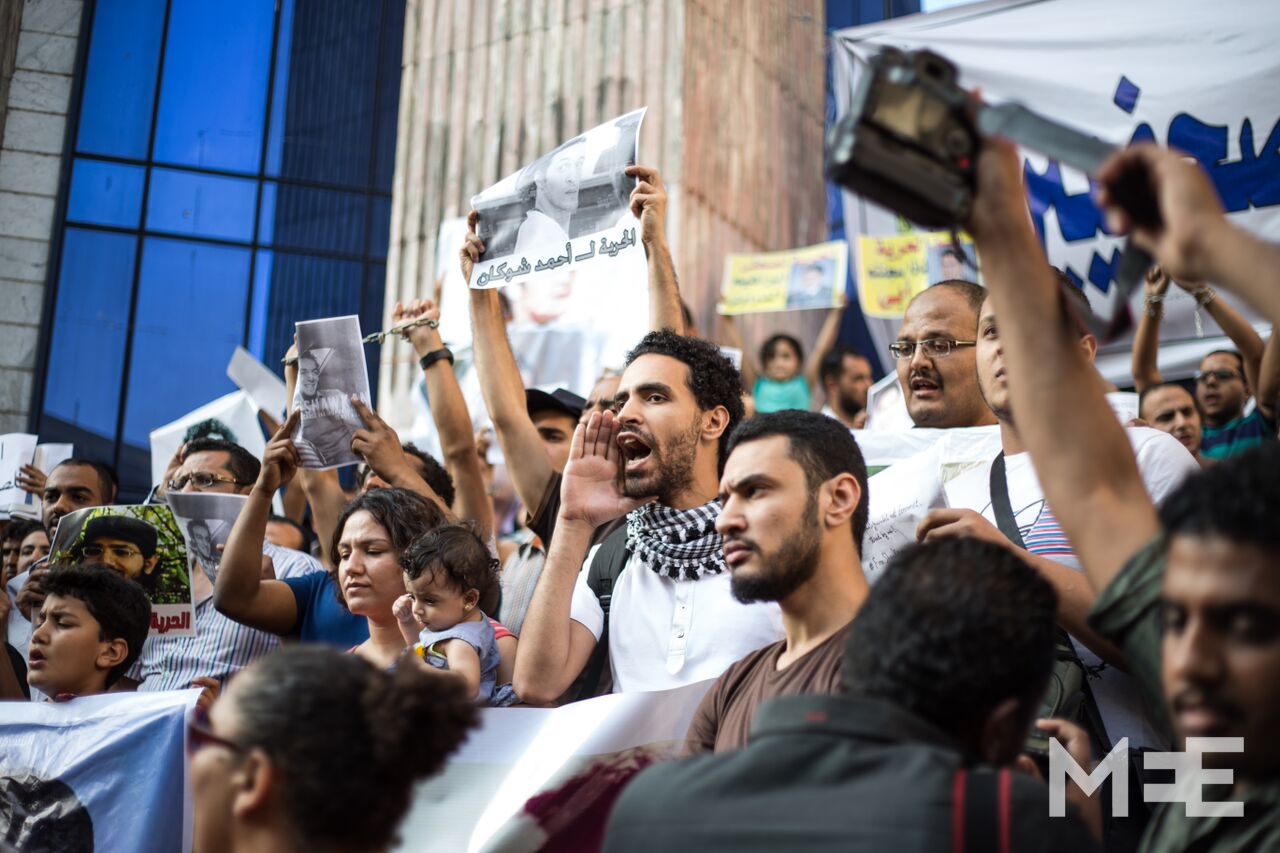
Zyada is an Egyptian photojournalist and columnist who was released last month after nearly 500 days in prison. Now 27, he was 25 when he was first detained. "They literally stole two years of my life," he says. Here, he tells Middle East Eye about his experiences of violence in prison, and why he still braves anti-government protests despite the increasing risk activists face
How did you come to be detained?
It was December 2013, and there were clashes at Al-Azhar University and a fire in the faculty of commerce there. My boss told me to go and cover what was going on.
I had graduated with a history degree from al-Azhar about six years before, but I’ve always harboured a love for photography.
During the 25 January revolution against Hosni Mubarak I was there in [Cairo's] Tahrir Square for the full 18 days. After that I decided to pursue a career in photojournalism, and became a videographer at an Egyptian news website.
That particular day in December 2013 I arrived at al-Azhar late - I don't own a car - so I had to take public transport there. By then the clashes had moved about a kilometre down the road to the faculty of agriculture. When I arrived at the burned faculty of commerce, the only people still there were the police. I was recording footage of the casualties when suddenly the police attacked two passing students in a barbaric way. They started beating the pair, and without thinking I pointed my camera towards them. Then two officers attacked me from behind, beating me with batons.
They took my camera and led me to their superior officer, who watched the footage of the officers beating the two students. He was furious - he ordered his officers to beat me again. Though I repeated that I was a journalist, he didn’t listen. He kept asking, as his officers were hitting me in the face, why I didn't film “the sons of bitches,” [referring to the protesting students]. I tried to respond, despite the beating, that I film everything: I just hadn't had a chance to get to the protests yet.
I was then carried to a police station.
What happened when you got to the police station and during the first days of your detention?
When anyone reaches the police station, camp or prison where he or she will be held, the new detainee must be "welcomed". The welcoming party is called “al-tashrifa”, and the idea is simple: the detainee must walk through a long line of soldiers and officers, some of them holding long sticks and batons. They beat detainees on every part of their bodies. They don’t care where they are hitting you: your face, your head, your legs and hands. They just don’t care.
The total number of people arrested that day was 76, including 14 girls. Everyone, apart from me. were students. I was the only photojournalist there.
The first thing I asked for after “al-tashrifa” was to make a phone call, a legal right in Egypt. I wanted to call my news website to tell them about my detention. But of course, I was denied that right, even though I showed them my card and my journalist permit.
I spent the night at the police station. First thing next morning, myself and the students were moved to al-Salam camp, a police camp used to train novice officers. It is illegal to keep detained civilians in any institution related to the military or the police other than a police station.
I spent four days in the camp. I saw terrible things there. They forced the male students to strip completely naked in front of the women, and to repeat that they were “whores” and “bitches”. If any of the students refused to repeat the phrases, they would be beaten until they complied. They didn’t do this to me, as by then they knew that I was a journalist. But seeing what was happening to the others was bad enough.
After four days there, I appeared before the prosecution. The charges against me surprised me. I was accused of burning the faculty of commerce and the faculty of agriculture, protesting, vandalism and attacking and assaulting police officers. The charges were entirely unreasonable. The same charges were pressed against the students who were detained with me, including the women. That was simply absurd: Al-Azhar University is segregated, and it is unbelievable that the girls would walk for five kilometres to burn the boys' colleges.
The chief detective insisted on adding that a handmade bomb and a Molotov cocktail were found on my person, in addition to the camera, the only thing I actually had with me. He didn’t want me to get out at all.
It was all a formality - they kept asking me if I set fire to the colleges, and if I assaulted the police officers, and I kept denying it. My lawyer was prevented from attending the investigation with me, which is also illegal.
I was moved once more, this time to Abo Zaabl prison. I stayed there for 497 days. During this time, I came before the prosecution every 15 days. After three hearings, I appeared only every 45 days. For the last seven months, I wasn’t permitted to stand before the prosecution at all. I was denied even my right to stand before the judges.
Tell me more about the time you spent inside the prison.
Life in prison is totally and completely different. Your ideas, your dreams, even your hopes change entirely. For example, the detainees are to be inspected every week, sometimes every two weeks. The officers enter the cell at 2 or 3am. They start by ransacking and taking everything in your cell, your books, your cigarettes, your blankets, your clothes, they take everything. Your highest hope at this time is that they won’t hit you. It doesn’t here matter if they take your possessions. There are about 15-20 detainees inside the cell, and if they start hitting, it is like hell, flesh and bodies lying over each other. The sticks and the batons of the officers hammering upon us while we are all piled in the corner. It is just like this, like hell.
This was your worst experience inside?
No, absolutely not. Being hit is really bad, but physical pain passes easily compared to the “cell of discipline”. This is a cell that is 50 centimetres in height, 30 centimetres in width, and you are put there with a small plastic box to shit in. And the thing is, you can’t stand or even spread your legs, you just sit there, with no windows or fresh air, just a small hole in the small door of the cell.
I was put in this cell three times. The first time was for one day. The second time was for three days, and the last time was for a whole week. It was the longest week of my life by far. We used to call this cell the “tomb of the living”.
You are stripped of all your clothes before going into the cell, and you are given very light clothes to wear. You are not given a blanket or anything, which makes your stay in the cell really hard, especially in the winter. You can’t stand, you can’t move to warm yourself, you can’t do anything. Time stops and freezes. All your hopes, dreams and ambitions revolve around getting out of this small cell. The ordinary crowded cell suddenly seems like a paradise. At least there you can stand, you can be warm, you can talk to other people, but in the “cell of discipline” you wait for nothing. The last time I was in that cell, I sang all the songs I knew, I thought of every possible idea, I thought of how I was going to look when I got out, I thought of every memory I still hold from my childhood, anything that would keep my mind busy.
Why were you sent to the “cell of discipline”?
I used to leak articles and messages about the conditions inside the prison. It was published on Facebook and other social media websites. Sometimes the officers inside the prisons would find out, and then I would be sent there as punishment.
Did you have any visitors while in prison?
They prevented my friends who came to visit from seeing me. They only allowed my brother, and though the legal duration of the visit is an hour and a half every week, they only allowed 15 minutes. My brother used to bring me anywhere from five to seven books every time he came, hot food, fruits and vegetables, but they didn’t allow any vegetables or fruits. They only allowed the hot food. My brother also brought me money to buy things from the canteen”.
The most important thing was not the food or the money, it was the books. I’ve read all the writings of Dostoevsky, including Notes from the Underground, the writings of Naguib Mahfouz, Alexander Pushkin, and more, the only thing that was good in the whole time I spent in prison, was that I had the chance to read all these books.
I used to see your pictures in many protests that I have covered. Did you know about this? How did it make you feel?
I knew about this, and what I felt was pure happiness. Any sign of solidarity makes a big difference for a detained person, it makes him feel that he is not forgotten. To be forgotten is the hardest thing.
When were you released? How did you know that you had been declared innocent?
I knew the following day, from a leaked newspaper article. I saw my name in it. That was after 490 days of detention. I counted them day by day. Honestly, I was sad for the other students. I was released alongside 11 students, but all the others had to stay in prison. More than 45 students who were with me in the same case are still in prison, students that I know for sure are not terrorists or anarchists. They are just peaceful protesters who wanted to express their refusal towards something they felt was wrong, the result was that they lost their future.
What was the first thing you did when you got out?
I was released a week after I was judged as innocent. When I got out, I saw the faces of my friends and my family members who came to wait for me. The first thing I did was run. I couldn’t believe it. I ran as fast as I could. I was so happy that moment that I needed to run. They all ran after me, I just couldn’t believe that I was finally out.
We then went to my house, we ignited red flares, and I insisted on leading the chants against the military regime ruling Egypt. I wanted to show that I was not broken, and that I would continue the struggle until every detainee is free.
How has your post prison experience been?
It is an experience full of suffering. Everything seems strange. Adapting to society again is really hard, as detainees spend 24 hours without doing anything. The idea that I am able to walk freely amongst the crowds, that I am able to take the metro or the bus, am able to wear colourful clothes, am able to sleep without being worried about someone inspecting me in the middle of the night, am able to eat what I want the time I want, am able to sit in the cafe and watch a football match… the small ordinary details of everyday life seem strange. You learn to appreciate and enjoy these details, and the realisation that there are thousands inside who are prohibited from these things is what motivates me to keep going and to ask to my fellow journalists to struggle more for the rights of detained journalists, especially people like Shawakan. It's like a circle, the more we keep silent regarding violations happening in the prisons of Egypt, the more is the likelihood that we are also going to be detained just like them.
I'm not going to lie, pretend that I'm a hero and say I don’t feel fear. The truth is, I am afraid, perhaps more than those who never went to prison. I am afraid, but I am not going to be silent, I am not going to stop taking pictures. I am not going to stop writing either articles or posts on social media websites exposing what is going on here in Egypt. Each person in Egypt is exposed to danger in a country ruled by the army and by fear. I realise that. I realise also that the risk is bigger for those who are active in the public scene, but I am going to take the risk and go all the way. I do what I do because It has to be done by someone, regardless of the consequences.
In brief, what do you think of the current regime ruling in Egypt?
It is a military regime that is attacking anyone related to the 25th of January revolution. Many people think that the regime is attacking and targeting the Islamists only, but that is not the case. The regime is attacking the 25th of January revolution itself. Journalism was the core of the revolution. The Khaled Said case, which ignited the revolution, was initially exposed and published by journalists. The regime wants revenge on journalism. The conditions in Egypt right now are exceptional and unprecedented, each aspect of freedom of expression is attacked and stifled, the article, the camera, the newspaper, all of these are prohibited and attacked in Egypt by the regime. We are going back to the days of Mubarak, where a protest was considered a miracle. The fact is, these days are definitely worse, we had no detained girls in the days of Mubarak. Now we have hundreds, including Esraa al-Taweil, a girl in her early twenties, kidnapped by police forces with two of her friends, and she has been missing for more than nine days now. We didn’t have this in the days of Mubarak. The thugs are ruling Egypt now.
What do you think about the future of Egypt?
A third wave is coming; a bigger and more destructive wave led by the youth and only the youth. The actions of the regime are escalating the heat and the anger in the streets. I don’t know when exactly, maybe this coming 30 June, maybe directly after it, maybe a year or two from now, but I am pretty sure that a third wave of the revolution is coming.
This interview will be published outside Egypt internationally. Do you have a message for the world?
Just don’t support injustice.
New MEE newsletter: Jerusalem Dispatch
Sign up to get the latest insights and analysis on Israel-Palestine, alongside Turkey Unpacked and other MEE newsletters
Middle East Eye delivers independent and unrivalled coverage and analysis of the Middle East, North Africa and beyond. To learn more about republishing this content and the associated fees, please fill out this form. More about MEE can be found here.


